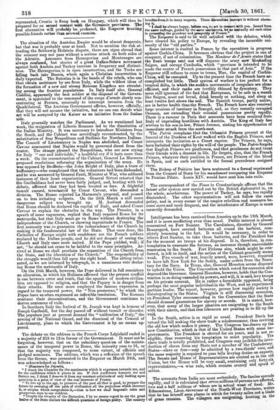Intelligence has been received from America up to the 18th
March, and it is more conflicting even than usual. Public interest is almost concentred on Fort Sumter. The Carolinians, directed by General Beauregard, have erected batteries all round the harbour, com- pletely hemming M. the fort. It would be necessary, in order to relieve Fort Sumter, to take these batteries, and the President has for the moment no troops at his disposal. It is, therefore, in con- templation to evacuate the fortress, an immense though unavoidable concession to the South. Fort Pickens also, which might be rein- forced, is left to itself, and the action of the Cabinet generally seems weak. Five vessels of war, heavily armed, were, however, reported to have left New York for the South, under orders from the Secre- tary for the Navy. In Texas, also, General Houston seems disposed to uphold the Union. The Convention which voted for secession also deposed the Governor. General Houston, however, holds that the Con- vention in so doing exceeded its powers, and will, it is said, levy troops on his private account. He is rather a formidable opponent, being perhaps the most popular individual in the West, and an experienced partisan leader. The report, however, proves how rapidly society is disintegrating in the States. Virginia is still discussing secession, ex-President Tyler recommending in the Convention that the State should demand guarantees for slavery or secede. It is stated, how- ever, that many of the larger planters are emigrating to the South with their slaves, and that free labourers are pouring in to fill up the void. Inthe South, action is as rapid as usual. President Davis has vetoed the bill making the slave trade a misdemeanour, thus reviving the old law which makes it piracy. The Congress has drawn up the new Constitution, which is that of the United States with some im- provements. The President is elected for six years, and is not. re. eligible, thus removing his temptation to court popularity. The slave trade is totally prohibited, and Congress may prohibit the intro- duction of slaves from any State not a member of the Confederacy. States—slave or free—may be admitted by a two-thirds' vote, and the same majority is required to pass bills levying duties on exports. The Senate and House of Representatives are elected as in the old Union, but the House will be very small, containing only forty,-six representatives,—a wise rule, which secures secre.ey and seem °f action.






























 Previous page
Previous page